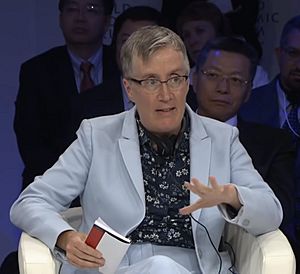Joanna Bryson facts for kids
Quick facts for kids
Joanna Joy Bryson
|
|
|---|---|

Bryson speaks at the World Economic Forum "Global Conversation on Artificial Intelligence" in 2018
|
|
| Born | 1965 (age 59–60) |
| Education | University of Chicago University of Edinburgh MIT |
| Known for | Artificial Intelligence |
| Scientific career | |
| Institutions | Lego University of Bath Hertie School |
| Thesis | Intelligence By Design: Principles of Modularity and Coordination for Engineering Complex Adaptive Agents (2001) |
| Doctoral advisor | Lynn Andrea Stein |
| Other academic advisors | Marc Hauser |
Joanna Joy Bryson (born in 1965) is a professor at the Hertie School in Berlin, Germany. She is an expert in Artificial Intelligence (AI), which is about making computers smart like humans. She also studies the ethics of AI, meaning what is right and wrong when using AI. She became a British citizen in 2007.
Contents
Becoming an AI Expert
Joanna Bryson has studied at many famous universities around the world. She learned about how people think and behave, and how to make computers think too.
Early Studies
Joanna Bryson finished high school in 1982. She then went to the University of Chicago and earned a degree in Behavioural Science in 1986. This field studies how humans and animals behave.
Advanced Degrees
In 1991, she moved to the University of Edinburgh in Scotland. There, she earned a master's degree in Artificial Intelligence. She also got another master's degree in Psychology.
Later, she went to MIT (Massachusetts Institute of Technology) in the United States. In 2001, she earned her PhD, which is the highest university degree. Her research was about designing smart computer systems.
Working with LEGO
While studying, Joanna Bryson also worked with LEGO.
- In 1995, she worked for LEGO Futura in Boston.
- In 1998, she was an AI consultant for LEGO Digital. She helped create smart characters for LEGO's Wizard Group.
Postdoctoral Research
After her PhD, she did more research at Harvard University in 2002. She studied how primates (like monkeys) think.
Teaching and Research
Joanna Bryson has taught and done research at several universities. She focuses on how AI works and how it affects people.
University of Bath
In 2002, she joined the University of Bath in the UK. She started a research group there called "Intelligent Systems." This group studied how to make smarter computer systems.
Other Universities
She was also a visiting researcher at other universities:
- University of Nottingham in 2007.
- Oxford University in 2010, where she studied how religion affects societies.
- Princeton University from 2015 to 2018. Here, she focused on creating ethical rules for designing AI and self-driving systems.
Professor in Berlin
In 2020, Joanna Bryson became a professor at the Hertie School in Berlin. She teaches about the ethics of technology, which means thinking about what is fair and right when we use new technologies like AI.
Public Discussions About AI
Joanna Bryson often shares her knowledge about AI with the public. She wants everyone to understand how AI works and its impact.
Important Ideas
In 2010, she wrote a chapter called Robots Should Be Slaves. This chapter discussed how we should think about robots and their place in society. She also helped create the "Principles of Robotics" in 2010, which are guidelines for how robots should be made and used safely.
Media and Advice
Her research has been featured in famous magazines like Science and Wired. She has also given advice to organizations like The Red Cross about self-driving weapons. She also talks to politicians about AI.
In 2022, she wrote an article for Wired magazine titled "One Day, AI Will Seem as Human as Anyone. What Then?". In this article, she talked about:
- What AI can and cannot do right now.
- How people think about AI.
- How AI talks with people using language.
- The EU AI Act, which is a new law in Europe about AI.
Awards and Recognition
In 2017, Joanna Bryson received an "Outstanding Achievement" award from Cognition X. She often appears in the news to talk about how humans and robots interact, and the ethical questions around AI.
See also
 In Spanish: Joanna Bryson para niños
In Spanish: Joanna Bryson para niños

